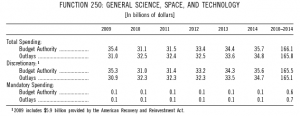The House and Senate both passed their Budget Resolutions last week. These are not actual appropriations. Instead, they are guidance on how to budget money in this and coming years (up to 2014, in this case). The right way to think about the budget resolution is as a ceiling; you’ll probably never get to spend more than these projections on a given area.
How did science fare? In the House [1], function 250 covers the spending outlays on science (NSF, NASA, DOE-SC). The 2009 number includes the stimulus money and totals $35.4B dollars. As expected, the number for 2010 drops, but that’s because the $5.9B from the stimulus is not present there. In fact, taking that out of 2009 gives us $29.5B in the base budget for 2009, and 2010 is authorized to $31.1 – a 5.4% increase over 2009. By 2014, the science budget will rise to the 2009 base+stimulus level of $35.7B, a 21% increase over 2009 base. According to the resolution, this is on track with the increases outlines in the America COMPETES Act, and leads to a doubling of the NSF budget.
In the Senate [2], Function 250 (Science) reaches $36.2B in 2014, 1.4% more than envisioned in the House. Some of the Senate language was interesting. On page 98 they note that the NASA budget supports increases in earth science, but that long term the human spaceflight program is threatened. They note the trend for NSF is in line with ACA and the committee ” . . . strongly supports the full allocation of the President’s FY 2010 budget request for NSF.” Regarding budget assumptions for energy policy, Senators Murkowsky and Bingaman note that “Paradoxically, however, current budget assumptions tent to overstate the financial risk and cost of development and deploying new energy technologies and understate their long-term economic benefits.” The committee generally supported the basic research spending for the DOE.
It will be interesting to see how this shakes out in appropriations. Now the hard work starts.
[1] http://frwebgate.access.gpo.gov/cgi-bin/getdoc.cgi?dbname=111_cong_reports&docid=f:hr060.pdf
[2] http://budget.senate.gov/democratic/documents/2009/senate%20budget200.pdf



